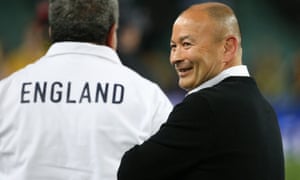
1. The errors of the past
The legacy of 2003 hung over England. As in, there wasn’t one. A great team reached the end of its time and slipped into retirement or, in the case of Jonny Wilkinson, into injury. Having dared ask what came next, Sir Clive Woodward, a veritable bubble-making machine when it came to ideas, shook his head in despair and left rugby to make tea for Harry Redknapp.
The RFU muttered something about no individual being bigger than the game, reached for the file marked “The Future” and found it empty. At which point, the antennae of every opponent twitched, triggering rugby revenge. They piled into England with relish. It goes with the territory.
Eddie Jones has – and how presciently he has tapped into a nation’s mood – reinforced the notion that there are no friends out there, that the team must embrace the reality of being the one everyone loves to beat. He has made England seriously determined of purpose. You can’t tackle the way they did in Melbournewithout having bought unquestioningly into the mission – to be the best. Everybody papers the walls of their fortress with statements of self-belief, modern-day adaptations of “This is Anfield”. They became a little silly. “Hundreds Before You, Thousands Around You, Millions Behind You” didn’t stand out nearly as much as the single word “Marketing” in the Twickenham tunnel. But “This is England” already comes with a chilling single-mindedness.
2. The back row
The second row of George Kruis and Mario Itoje lit up the Six Nations Grand Slam, and they have been most effective again in Australia. But the back row have stolen their thunder. Jones revs up James Haskell with jocular abuse and Billy Vunipola with love. Whatever it takes. There is a collective project but individuals have to be inspired. To turn a No8 for whom 80 minutes was a time-scale he didn’t recognise into an indefatigable work-horse is nearly as impressive as making Haskell the No7 that outplayed Australia’s specialists in that shirt, and Robshaw the No6 that has swept past 50 caps – not bad for a captain stripped of command and denied respect. Robshaw epitomises the selflessness of the new pack and, in doing so, has made the six-and-a-half a specialist position that every good team should have. No7 is so passé – although he probably doesn’t tell Haskell that. When the combination had to be changed for the final Test, its special quality was underlined by the exit of Teimana Harrison after half an hour. Sean McMahon and Michael Hooper had their best games when Haskell wasn’t there. It was an absence that made his presence all the more impressive.
3. The mind games
These are early days in the cycle of Jones and what works now may not be so effective in Japan at the World Cup in 2019. But he has been wonderful value as an entertainer in charge of selling England pre-match, in contrast to his obvious thoughtfulness in the more important business of makingthem perform in the Tests.
His rival and old mate from Randwick Michael Cheika opted for what he hoped would be dignified silence, but now stands accused of being bullied in the battle of the briefings.
It’s not as if Jones has suddenly burst on the scene, but how to counter his scene-stealing performances is going to exercise the minds of many a coach and media manager. They have three and a half years to work him out. He has that same time to enjoy what seems to come very naturally to him. In the battle of wits – of wit – he is way out in front.
4. The bench
If coach Jones has enjoyed himself off the field he has been ruthless when it comes to changing the lineup if the balance isn’t right. Off went Luther Burrell in the first Test; off went Harrison in the third. Owen Farrell came on to start the first of his two 24-point hauls, the ultimate in making a point off the bench – making him indispensable thereafter. Courtney Lawes had an impact as a replacement too – as did Jamie George, the footballing hooker who came on for Dylan Hartley. George would make the starting XV of many countries, but he will have to wait his turn behind the England captain. How can you change a captain who has won eight out of eight and thanked Australia for having them?
5. Owen Farrell and George Ford
It is a combination that shouldn’t work. Farrell cannot be an inside centre, can he? He can do the second five-eighth thing – the supplementary kicker out of hand, the complementary distributor to the 10 – but there has to be a physical deficiency, doesn’t there? From the back of scrummages and the tail of lineouts, and through cut-backs in midfield, there will be a lot more heavy traffic coming the way of England’s 10 and 12. Won’t there?
So far – and ever since Farrell came on to replace Burrell in the first Test – that supposed weak point in the defensive front has given very little away. It is equally true that they have hardly honed a cutting edge in attack, but this was never going to be a campaign where England’s running and passing, so fruitfully employed in the Six Nations, took the next step forward. This was about winning a first series in Australia and you have to overcome the full-on assault first. Ford and Farrell have yielded not an inch. They have proven themselves in the darkness; unveiling skills in daylight should be less difficult.
